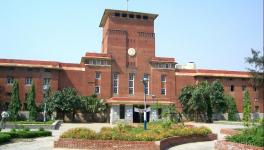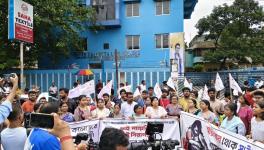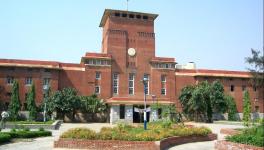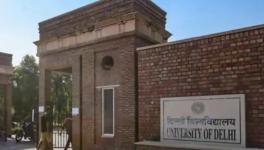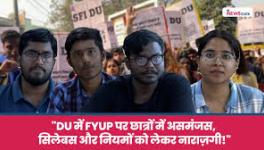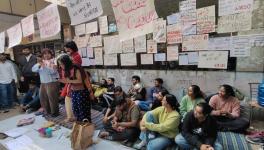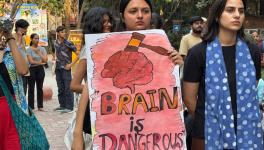DU Teachers March against Privatisation of Education
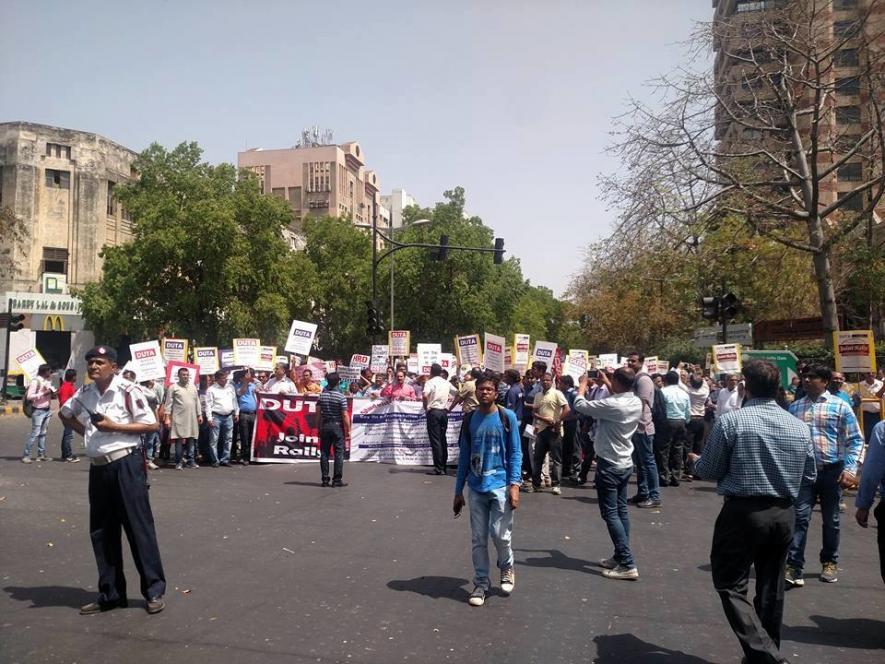
The Delhi University Teachers’ Association (DUTA) called for a joint rally of students, teachers and Karamcharis today, 29th March, 2017. The protest march was from Mandi House to Jantar Mantar, against DU colleges being granted autonomy.
Currently, the university has a federal structure which allows colleges to get 95% funding from University Grants Commission (UGC). The move has been introduced by the Government as part of its policy to bring down funding in Higher Education
The autonomy of colleges will provide the management more power to start new courses and increase tuition fee. DUTA members argued that autonomous status will only hamper the service condition of teaching and non-teaching staff. They demanded that the university officials stop pressurizing colleges into applying for autonomy.
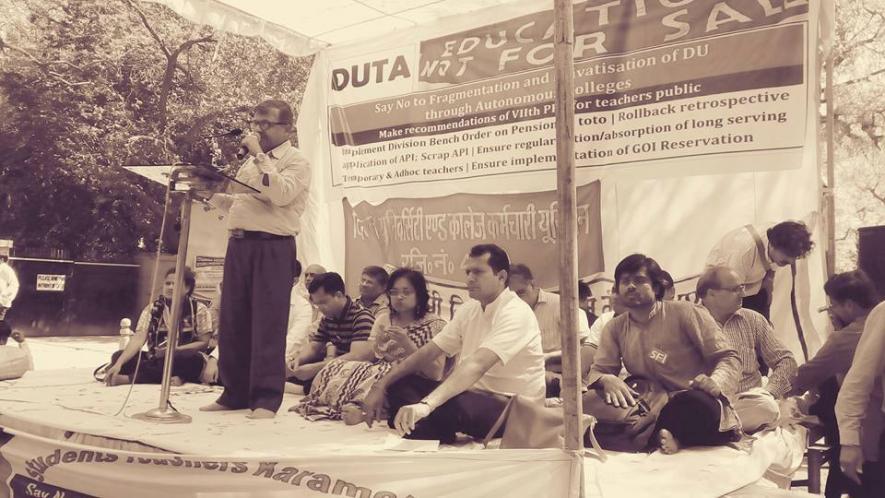
The March saw the participation of a large numbers of teachers and Karmacharis from almost every college, including a large contingent from the DUCKU, and student organisations such as AIDSO, AISA, AISF, CYSS, KYS, NSUI, SFI and YS.
The DUTA while giving a call for the march had issued a Leaflet on the same issue. The Leaflet read, “The push for autonomous colleges should be seen in the context of the fact that the education policy since the nineties has caused a steady decline in the share of public funded institutions and a corresponding rise in the share of private institutions. Successive Governments have eagerly pushed to concretise the initial offer India made to the WTO/GATS to open up higher education, health and other services for free trade.
The Autonomous Colleges scheme is a scheme to further privatise and commercialise higher education, and to lessen the gap between fees structures in public and private institutions. It is a scheme that will adversely impact on the need for affordable and quality education. This will hit all sections of society, especially women, economically deprived students and students from backward and vulnerable sections/castes the most. A joint movement by students, teachers, karamcharis, parents and concerned citizens is the only way ahead.”
Earlier the professors of St Stephens College had posed some question in front of the administration on the question of autonomy. About 50 professors of the college had resigned from their administrative positions, including the positions of head of departments and dean of academic events, in what is being termed as an academic coup inside country's premier institution. The questions that the teachers asked were conveyed in a letter which read:
As important stakeholders of St Stephen’s, we feel that information now available – in the UGC guidelines on autonomy and in your brief document on what an autonomous St Stephen’s might look like – is highly inadequate and cannot form the basis of either an informed decision on the question of autonomy or of meaningful consultations on it. In fact the UGC guidelines are simply a set of instructions issued to the prospective colleges regarding the detailed preparation they have to undertake before they contemplate an application for autonomous status. The guidelines offer no further information or details. For meaningful consultations, it is imperative that the Governing Body bring out a White Paper or some such legally binding document in which it clearly addresses our concerns and those of other stakeholders. An illustrative list (by no means exhaustive) of some of the concerns that we would like the Governing Body to address in the proposed White Paper are posed below.
1) Can St Stephen’s preserve its tradition of being a leading liberal arts and sciences college within the new scheme? In the absence of the supervisory role of Delhi University in academic programmes, in evaluation and in faculty hiring, can a small institution like St Stephen’s maintain its high academic standards? With the withdrawal or reduction of funding by the UGC, will the college not be forced into starting expensive progammes that go against its ethos?
2) Will we, like scores of other autonomous colleges, have dual streams (aided and self- financed) of courses, fees, faculty, students, pay scales, security of tenure, service conditions and so on?
3) What will be the academic and administrative model of an autonomous St Stephen’s when it is less closely bound to the Delhi University? Who will determine the protocols for the hiring of faculty and other staff and the service conditions of the employees?
4) What precisely is the financial model envisaged to support an autonomous St Stephen’s College? This is a matter of utmost importance that affects virtually everything else, including the academic ethos of St Stephen’s, the way the college is governed, the kind of infrastructure available, the kind of students and faculty that it is likely to get. There is absolutely no clarity with regard to the level and extent of committed and assured grants in aid to the college by the UGC to fulfil its financial obligations to the past and current faculty and employees, including pensioners.
5) If the financial model includes a range of expensive programmes beyond the reach of most college-going students, what will happen to the inclusive character on which St Stephen’s now prides itself?
6) In the absence of the checks and balances provided by the Delhi University what will be the service conditions of the faculty and other workers – both those now in the employment of the college and those that may be hired in future? How will grievances be addressed? How will salaries and promotions be decided? What will be the new conduct rules?
There are numerous other questions that would arise once the consultations ensue around the White Paper. It is precisely for this reason that many other similarly placed and prestigious colleges in Delhi have, after consultations in their Staff Council, and in accordance with the consensus that was arrived at, decided not to apply for autonomous status at the present juncture.
Sincerely,
(Signed by 42 permanent teachers)
Nandita Narain
(President, Staff Association, St. Stephen's College)
Get the latest reports & analysis with people's perspective on Protests, movements & deep analytical videos, discussions of the current affairs in your Telegram app. Subscribe to NewsClick's Telegram channel & get Real-Time updates on stories, as they get published on our website.












